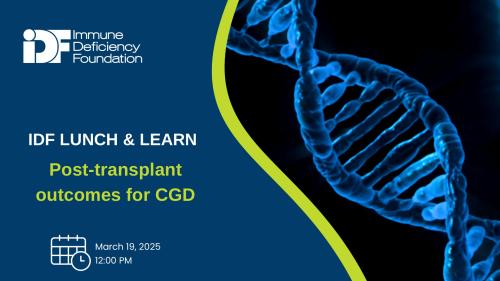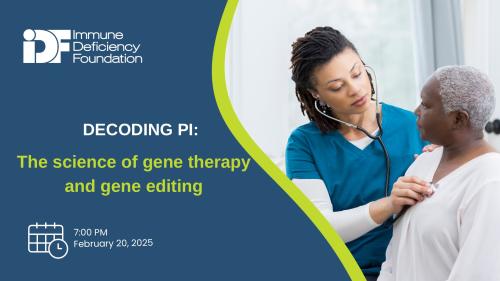
-
Understanding primary immunodeficiency (PI)

Understanding PI
The more you understand about primary immunodeficiency (PI), the better you can live with the disease or support others in your life with PI. Learn more about PI, including the various diagnoses and treatment options.
-
Living with PI
-
Addressing mental health
-
Explaining your diagnosis
- General care
- Get support
- For parents and guardians
-
Managing workplace issues
- Navigating insurance
-
Traveling safely

Living with PI
Living with primary immunodeficiency (PI) can be challenging, but you’re not alone—many people with PI lead full and active lives. With the right support and resources, you can, too.
-
Addressing mental health
-
Get involved

Get involved
Be a hero for those with PI. Change lives by promoting primary immunodeficiency (PI) awareness and taking action in your community through advocacy, donating, volunteering, or fundraising.
-
Advancing research and clinical care
-
Grants
-
IDF surveys
-
Participating in clinical trials
-
Diagnosing PI
-
Consulting immunologist
-
Clinician education

Advancing research and clinical care
Whether you’re a clinician, researcher, or an individual with primary immunodeficiency (PI), IDF has resources to help you advance the field. Get details on surveys, grants, and clinical trials.
-
Grants
When a child is first diagnosed with chronic granulomatous disease (CGD), it can shock families and bring up challenging emotions. Many parents experience anxiety and depression, as they’ve watched their child struggle for months or years with infections, surgeries, and hospitalizations, only to be told that the cause is CGD. CGD is a potentially fatal primary immunodeficiency (PI) that requires lifelong preventative medicine or treatment with hematopoietic stem cell transplant (HSCT), also known as bone marrow transplant or stem cell transplant. Even with treatment, there could be complications from side effects or past infections.
Families need support, and the Chronic Granulomatous Disease Association of America (CGDAA) is a beacon of hope in what can be a difficult time. The CGDAA is a non-profit patient organization committed to advocating for persons affected by CGD.
CGD is a genetic condition in which the body fails to produce an enzyme in white blood cells responsible for killing certain bacteria and fungi. People with CGD are vulnerable to infections in the liver, lungs, skin, and lymph nodes, and develop inflammation, or granulomas, at the site of infection. Infections are chronic and can be life-threatening. CGD occurs in about one out of every 200,000 to 250,000 births, and most cases are X-linked, which means mothers are the carriers of the CGD gene variant.
The mother of a son diagnosed with CGD as an infant and treated successfully with a stem cell transplant at age four, Felicia Morton, is the founder and executive director of the CGDAA. The mission of the CGDAA is to advocate for patients, carriers, and families by providing clear, accurate, and independent news information about CGD and CGD research.
The CGDAA provides resources, such as downloadable guides on CGD symptoms and treatment for patients, carriers, and medical providers; a video series by leading CGD expert Dr. Henry Malech of the National Institutes of Health; blogs on topics like X-linked CGD carrier status, patient success stories, and family planning; and Coffee and Carriers, a Zoom gathering of parents, patients, carriers, and siblings who meet for presentations and discussions.
“It’s very therapeutic,” said Morton of Coffee and Carriers. “We meet once a month. Sometimes we have webinars where we host CGD experts or clinical researchers on CGD, or we just take an opportunity to chat about what we are going through. It makes us feel less isolated just knowing that someone has experienced the same thing – it’s helpful for us all, and we welcome everyone.”
CGDAA reaches about 600 people in the CGD community through its email newsletter and countless families worldwide through a social media presence on Facebook, Instagram, and Twitter.
“We are making an impact whenever we connect with a family either via one of our programs or through our website and help them get treatment or the medical attention they need,” said Morton. “In this way, I feel we are fulfilling our mission to provide news and information so that parents, carriers, and patients can make the right decisions.”
Morton started the CGDAA in New York as a non-profit in 2019, but the organization's roots go back much further. The inspiration for the CGDAA began as a separate patient organization called the CGD Association, based in California, and led by the late Mary Hurley who had two sons with CGD.
In the 1980s, Hurley and her husband formed the CGD Association, a hub of information for families living with CGD and providers wanting to learn more about this rare primary immunodeficiency (PI). Hurley wrote and distributed a quarterly CGD newsletter, created a patient registry, and traveled across the globe to seek more knowledge of CGD and its treatments. Hurley also served as a volunteer for IDF (as does Morton). When Hurley passed, and her CGD Association was dissolved, Morton stepped in to fill a deep need in the CGD community for advocacy and support.
Morton said Hurley was a role model for the CGD community, and she left a legacy that is continued by the CGDAA.
“I know what it’s like to get that devastating diagnosis,” said Morton. “It’s earth-shattering to look at your seemingly healthy child and hear your doctors tell you that your baby has a lethal disease that is so rare, and you don’t know where to turn. Fortunately for me, I found Mary Hurley online and reached out to her immediately; she was one of several mother-CGD warriors who guided me through this battle, and I can’t imagine having done this without her.”
“So, if I can be that person for someone else, I feel like I’m paying it forward for everything she did and for all the other CGD moms who helped me find my way forward. We can’t really do this alone.
“This is the type of disease that has no clear-cut path forward. You can either decide to manage CGD through daily prophylaxis or pursue a stem cell transplant. Either decision comes with more questions and risks. We need to connect and need each other’s experiences, share our stories, and support one another.”
Morton said she talks to mothers about all kinds of challenges they might be experiencing. Many reach out for Morton’s help to facilitate a connection to the National Institutes of Health or a local CGD specialist. Some may need a computer or hotspot via the CGDAA’s PCs for People program, which provides free devices for members of the CGDAA community. Also, as the CGDAA continues to raise awareness of the health issues and ailments that female carriers of X-linked CGD can face, more women are getting in touch to find medical providers and specialists for themselves.
“In our community, because CGD is so rare, we really do become like a family,” said Morton. “Sometimes our blood relatives can’t relate. They can try, but no one understands unless they’ve had a child with CGD or have been a patient. When moms are down and feeling hopeless, sometimes they just need a sounding board, and I’m here to listen. If there’s something I can do to put them in touch with a specialist or to locate resources or another mom who has gone through what they are going through, then I’ve done my job.”
In addition to advocating for patients with CGD, Morton is committed to raising awareness of the health issues that female carriers can experience, such as gastrointestinal problems, dermatological issues/skin infections, joint pain/rheumatological disorders, and feelings of depression and anxiety.
Morton is particularly proud of a survey study the CGDAA worked on to better understand carriers’ health issues, which took place in collaboration with Dr. Jennifer Leiding, a Johns Hopkins University adjunct professor and a pediatric allergist/immunologist at Orlando Health Arnold Palmer Hospital for Children’s Infectious Diseases and Immunology, and the Primary Immune Treatment Consortium (PIDTC). The group presented an abstract of their findings at the annual Clinical Immunology Society meeting this year.
“It was gratifying to see that our hard work had been accepted and approved by the immunology community, said Morton. “Most importantly, our study shows that CGD can affect the whole family, not just male patients. Medical providers need to care for female X-linked carriers too; thanks to our work, more and more physicians are doing that, and women in our community are finally getting the care and treatment they deserve.”
When Morton isn’t dedicating time to the CGDAA, she stays busy with her children - 14-year-old Lydia, and 10-year-old Sebastian. Diagnosed with CGD at five months old, Sebastian received an unrelated cord blood transplant at Duke University Hospital at age four and today is a healthy and active child.
“Every day I’m in awe of my son. It’s the little things, such as dropping him off at school and watching him run into the door of the school building, like any other kid,” said Morton. “Those are the moments I was worried may never happen.”
Morton said that all Sebastian ever wanted, and all most children want, is a normal life - to spend time at home with their families, go to school, and have friends.
“When I see Sebastian running around the playground with a buddy or playing with his big sister, Lydia, it fills my heart with so much gratitude that I feel like I could burst with joy,” said Morton. “It’s hard to put into words, but I can tell you that I never take these normal, everyday experiences for granted.”
______________________________________________________________________________________________________
Get IDF blogs and podcasts delivered straight to your inbox! To sign up, follow these steps:
Go to the My Profile page of your IDF Account. If you’re not signed in, sign in or create a new account.
Scroll down to the Portal Communications Preferences section.
For Communications Level, select Power Reader from the drop-down box.
Diagnosis
Related resources
Sign up for updates from IDF
Receive news and helpful resources to your cell phone or inbox. You can change or cancel your subscription at any time.





The Immune Deficiency Foundation improves the diagnosis, treatment, and quality of life for every person affected by primary immunodeficiency.
We foster a community that is connected, engaged, and empowered through advocacy, education, and research.
Combined Charity Campaign | CFC# 66309




